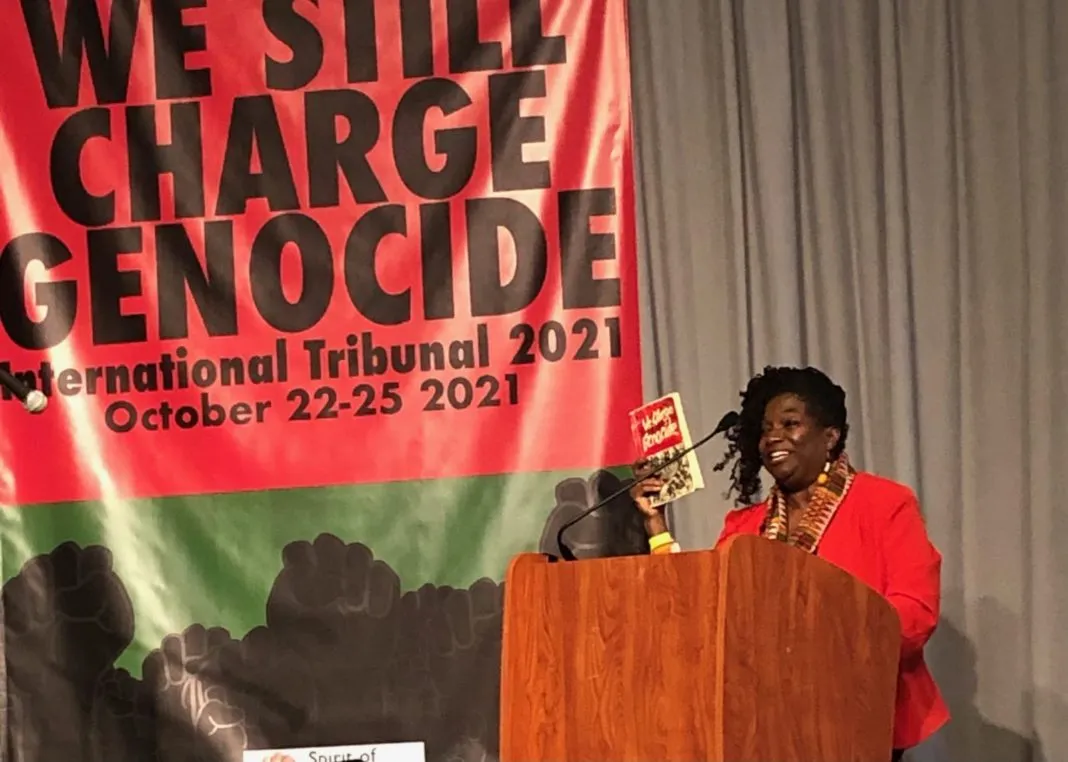On October 22 and 23, a distinguished panel of nine international jurists met to discuss allegations of genocide, among other international human rights abuses, brought against the United States.
The extent to which the United States' history of oppression has led to modern inequality has remained a topic of debate among politicians, activists, and the average citizen, but after presenting their findings, a skilled team of 30 lawyers and law students hoped to reach a conclusion on the world stage.
The panel convened at the historic Malcolm X and Dr. Betty Shabazz Memorial and Educational Center in New York City. The location chosen was significant, as it was the location of Malcolm X's assassination in 1965, which occurred during a conference in which X called on the international community to investigate crimes committed by the United States against its people.

The jurists, led by Nkechi Taifa, an acclaimed and internationally recognized human rights attorney, examined evidence and testimony over two days. The proceedings examined the evidence in five categories: police killings, mass incarceration, political prisoners, environmental racism, and public health inequities.
"We cannot forget that the United States was created over the bones of our Black people who were enslaved, over the bones of our Native American people who were massacred and were thrown out of the land. We cannot forget that slavery and colonialism are institutions of imperialism," said jurist Wilma E. Reeveron as the proceedings began.
The members of the panel were: Magdalene Moonsamy of South Africa, Wilma E. Reveron Collazo of Puerto Rico, Dr. Vickie Casanova-Willis of the United States, Kassahun Checole of Eritrea and the United States, Sherly Fabre of Haiti and the United States, Prof. Mireille Fanon Mendes-France of France, Dr. Alexander Hinton of the United States, Brain Moskewtah Weeden of the Mashpee Wampanoag tribe, and Binalakshimi "Bina" Nepram of Manipur/Northeast India.
Police brutality
The first testimony presented to the jurists concerned police brutality. The arguments showed that people of color are murdered by American police officers at alarmingly higher rates than white people. A recent commission of inquiry found that "Black people are 3.5 times more likely than white people to be killed by police when Blacks are not attacking or do not have a weapon."
A recent report released in July from the Seattle Police Department found that these numbers not only check out but are even higher here. The report states that Black people, per capita, are seven times more likely to be subjected to force by the SPD and five times more likely than white people to be stopped and questioned. Even more staggering, the report found that Indigenous people are nine times as likely to be stopped.
Mass incarceration
The investigation of mass incarceration found substantial evidence to back the theory that the modern prison system is fundamentally based on chattel slavery. While the 13th Amendment banned slavery in the United States, it does include a clause allowing forced and unpaid labor to continue in the prison system. Even today, private prisons are legally able to profit off of the work of their prisoners.
Evidence was also presented arguing that the American prison system is inherently racist due to the sheer disproportion of people of color behind bars. Despite Black people making up 13.4% of the US population, they account for 38.1% of all US prisoners.
On a global scale, the United States has the most incarcerated citizens in the world. As of 2021, two million people are behind bars in the US. The effect of mass incarceration means two million fewer voters, as felons lose that right. With one in three Black men and one in six Latinx men behind bars, this effectively takes political power away from America's most racially marginalized communities. The outcome is a disproportionate number of Black and Brown people forced into labor they are not paid for, stripped of their right to vote, and put at a severe disadvantage when it comes to finding an income.
Political prisoners
Despite its status as a developed and global-north country, the United States has a shady history of imprisonment of political activists. Civil rights heroes from Martin Luther King Jr. to Angela Davis served time in US jails and prisons once their voices started to resonate.
In the international tribunal's investigation, evidence of the continued imprisonment with Leonard Peltier was introduced. Born on the Turtle Island reservation, an active member of the American Indian Movement, and a resident of Seattle for a time, Peltier was imprisoned in 1977 following the murder of two FBI agents.
Peltier continues to serve two life sentences but has remained adamant about his innocence, and has garnered international support from Amnesty International, Nelson Mandela, Mother Teresa, and the Dalai Lama.
Witnesses testified that political prisoners, like Peltier, have been tortured, and some have even faced decades of solitary confinement, meeting any modern definition of torture.
Environmental racism
On the accusation against the US regarding environmental racism, evidence showed that the climate crisis has disproportionately impacted Black and Brown communities and is currently the result of decades of intentional poisoning of land, water, air, and soil.
A 2018 finding from the Environmental Protection Agency found that in the United States, pollution and its sources are most often found in communities of color. Black people are exposed to 1.5 times more unhealthy particulate matter than white people. These numbers aren't a coincidence either, as the testimony provided circumstantial evidence that communities affected by infrastructural failures, such as Flint, Mich., tend to be predominantly Black and Brown.
Public health crisis
The panel concluded by hearing arguments about the United States' failure to handle the current COVID-19 public health crisis efficiently and the effects this has had on Americans of color. Evidence indicated that Black and Brown Americans do not have equal access to health care and are more likely to live in food deserts, be subjected to forced sterilization, live with exposure to chemical contamination, and develop toxic stress.
The outcome of such disparities means that Black Americans have the highest mortality rate for all cancers and an infant mortality rate twice that of white people. Medical practices have evolved from false-science eugenics; in some parts of the country, it is still taught that people of color have different pain tolerances than white people. This leads to medical practices that do not take concerns of Black and Brown patients as seriously, often requiring them to spend more money out of pocket to receive an accurate diagnosis and treatment.
Guilty
On the final day of testimony, the jurists read their verdict aloud at the Church Center of the United Nations. They unanimously found the United States guilty on all charges. As Tafia explained in her closing argument, all counts fit the international definition of genocide.
"The testimonies we have heard all have included substantial evidence on the erasure of histories, distortion. And cultural misappropriation contributes to and exacerbates the attempted invisibilization and denial of people's basic humanity," said jurist Binalakshmi Nepram. "The profound impacts of all these realities extend beyond the erasure and the attempt to exterminate Black, Brown, and Indigenous lives, hence as one witness stated, the colonization of the spirit and the mind continues still today."
In an official statement released by the tribunal, the jurists declared, "After having heard the testimony of numerous victims of Police Racism, Mass Incarceration, Environmental Racism, Public Health Inequities, and of Political Prisoners/Prisoners of War, together with the expert testimonies and graphic presentations, as well as the copious documentation submitted and admitted in the record, the Panel of Jurists find the US and its subdivisions GUILTY of all five counts. We find grounds that Acts of Genocide have been committed."
"It is our intent and our hope that this tribunal's application of the intensified nomenclation of genocide will shock the conscience of the public to intensify actions to remedy the problem," said Taifa as the hearings concluded.
While President Biden and his administration have yet to comment on the ruling or the tribunal itself, the eyes of the world's most powerful leaders are on the US, leaving many hopeful that meaningful change may soon be around the corner.


